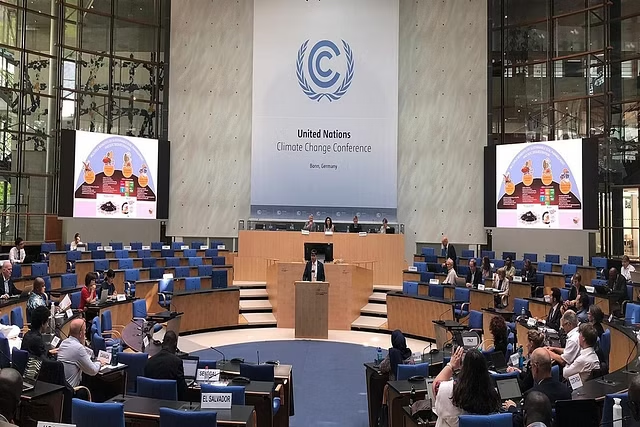A missed opportunity?

The recent Bonn Climate Change Conference has set the stage for the pivotal COP29 summit, highlighting the urgency and complexity of the global climate crisis. As representatives from nearly 200 countries convened in Bonn, Germany, to negotiate and strategise, the stakes have never been higher. The outcomes of these talks were expected to significantly influence the agenda and success of COP29, which will be held in Baku, Azerbaijan, later this year. However, contrary to the expectations, the Bonn talks have failed to live up to the expectations — leaving a lot on the plate for COP29 in Baku.
The Bonn talks serve as a preparatory meeting for the annual Conference of the Parties (COP) under the United Nations Framework Convention on Climate Change (UNFCCC). This year’s conference aimed to address critical gaps in climate policy, enhance commitments made under the Paris Agreement, and foster cooperation among nations to meet their climate goals. With the devastating impacts of climate change becoming increasingly evident—from unprecedented heatwaves and wildfires to severe floods and hurricanes—the urgency to act has never been clearer.
One of the central topics at the Bonn talks was the implementation of the Paris Agreement’s Article 6, which governs international carbon markets. Effective carbon trading mechanisms are crucial for reducing global emissions cost-effectively. Despite progress, disagreements persist over how to ensure transparency and avoid double-counting of emissions reductions. Resolving these issues is essential for building trust and facilitating international cooperation. Another significant focus was on climate finance. Developing countries, which are often the most vulnerable to climate impacts, emphasised the need for increased financial support from wealthier nations. The USD 100 billion annual commitment made by developed countries in 2009 has yet to be fully realised. According to the OECD, in 2020, climate finance flows reached only USD 79.6 billion. The gap highlights the need for more robust financial mechanisms and innovative solutions to mobilise the necessary funds.
Adaptation and resilience were also high on the agenda. With the frequency and intensity of climate-related disasters rising, there is an urgent need to strengthen adaptive capacities. The Global Adaptation Goal, established under the Paris Agreement, seeks to enhance adaptive capacity, strengthen resilience, and reduce vulnerability to climate change. However, progress has been slow, and the Bonn talks underscored the need for concrete actions and measurable targets.
Unfortunately, the much-anticipated New Collective Quantified Goal (NCQG) on climate finance remained a bone of contention. Resultantly, the developed and developing countries failed to reconcile with each other. Developing nations called for increased grant-based and concessional financing, while developed countries proposed including certain developing countries in the contributor base, in line with “new economic realities.”
The discussions also highlighted the importance of nature-based solutions (NBS). Integrating natural ecosystems into climate strategies can provide multiple benefits, including carbon sequestration, biodiversity conservation, and improved resilience to climate impacts. Countries like Costa Rica and India showcased successful NBS initiatives, calling for increased global support and collaboration in this area.
As the Bonn talks conclude, the path to COP29 is fraught with challenges but also ripe with opportunities. The upcoming summit in Baku will need to address unresolved issues from Bonn and set ambitious, actionable goals. One of the critical tasks will be enhancing Nationally Determined Contributions (NDCs). According to the UNFCCC, current NDCs are insufficient to limit global warming to 1.5 degrees Celsius above pre-industrial levels, a target deemed necessary to avoid the worst impacts of climate change. Strengthening these commitments and ensuring their effective implementation will be of paramount importance. The role of the private sector will be crucial in driving climate action. Businesses and investors are increasingly recognising the risks and opportunities associated with climate change. Transitioning to a low-carbon economy requires substantial investments in renewable energy, sustainable infrastructure, and innovative technologies. The Bonn talks emphasised the need for public-private partnerships to accelerate this transition and scale up climate solutions. Moreover, civil society and youth movements continue to play a vital role in advocating for ambitious climate action. The Bonn conference saw numerous protests and demonstrations, reflecting the growing public demand for urgent and decisive action. Engaging these stakeholders and ensuring their voices are heard will be critical in shaping the outcomes of COP29.
The Bonn talks have set a critical foundation for the forthcoming COP29, highlighting both the progress made and the significant challenges that lie ahead. As the world gears up for the Baku summit, the focus must remain on enhancing international cooperation, increasing climate finance, and implementing effective adaptation strategies. The road to COP29 is not easy, but with collective effort and unwavering commitment, it is possible to steer the world towards a sustainable and resilient future.



